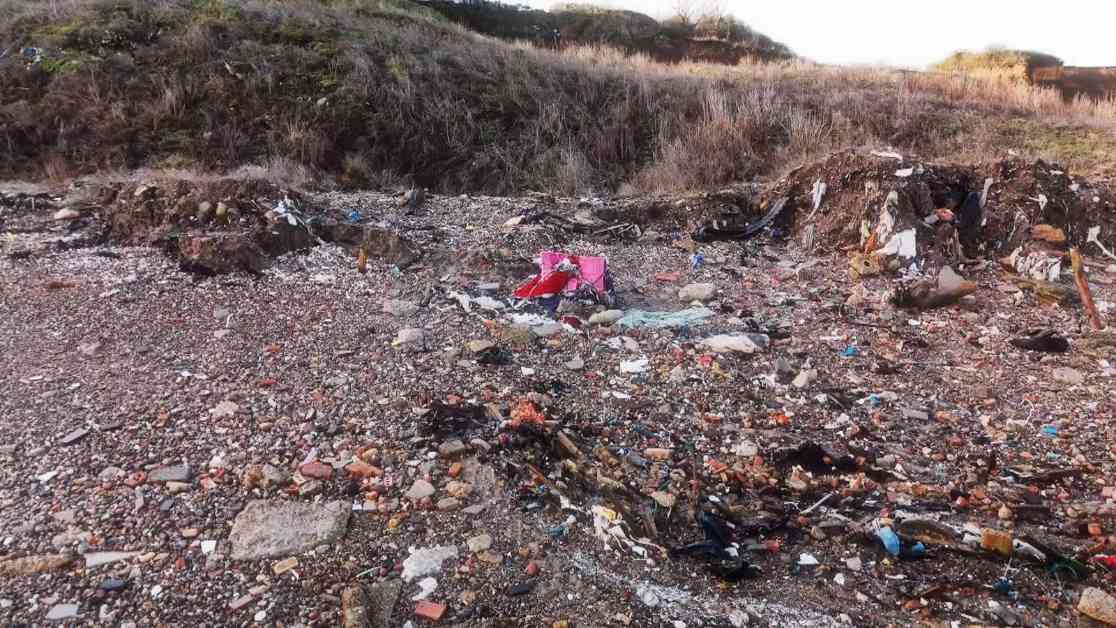On a brisk February morning, a group of dedicated volunteers gathers at Minster, located on the Isle of Sheppey in Kent, ready to tackle the pressing issue of illegal waste dumping on the local beach. Equipped with blue plastic bags and litter pickers, they set out along the shore, scouring the pebbles for debris left behind by careless individuals. But this isn’t your typical beach clean-up; they are on a mission to rid the coastline of builders’ rubble and shredded household waste that has been recklessly discarded at an illegal dump site near Eastchurch Gap between 2020 and 2023.
As they sift through the sand, Chris, one of the volunteers, laments the disturbing items he finds in his bin bag – from guttering and pipes to rawlplugs and plastic debris. Belinda Lamb, the organizer behind these clean-ups, describes the heartbreaking sight of shredded Christmas trees, bits of carpet, and spongy playground material that now litter the once pristine beach. “It’s really sad,” she reflects, noting the detrimental impact of this waste on marine life and the potential consequences for human health if this plastic pollution continues to spread.
The Problem of Illegal Waste Dumping Unveiled
Five years ago, the residents of Minster on Sea Parish Council noticed a troubling trend – lorries began appearing at an illegal dump site near Eastchurch Gap, unloading their cargo of waste day after day. This relentless stream of vehicles left behind heaps of decaying trash and plastic debris that now line the shoreline, posing a threat to the local ecosystem and wildlife. Despite the valiant efforts of volunteers who conduct monthly clean-ups, the sea’s relentless tides continue to wash in more refuse, perpetuating a cycle of pollution that seems impossible to break.
Elliott Jayes, the chair of the parish council, expresses frustration at the lack of swift action taken to address this environmental crisis. He emphasizes the need for urgent intervention by the Environment Agency to shut down the illegal dump site and hold those responsible accountable. Investigations are ongoing, with a six-month restriction order initially granted in 2023 to close the site, later extended to prevent further dumping. Concrete blocks now seal off the area, deterring future offenders from exploiting this once-pristine coastline.
The Rise of Waste Crime: A Looming Threat
While the perpetrators behind the Eastchurch Gap dump site remain unknown, the issue of illegal waste dumping is far from isolated. Across the UK, criminal gangs are capitalizing on this lucrative yet nefarious activity, turning waste management into a profitable enterprise with minimal risks and high rewards. Sam Corp from the Environmental Services Association sheds light on the growing presence of organized crime in the waste sector, likening it to “the new narcotics” due to its widespread impact on communities and the environment.
It is estimated that one-fifth of all waste in England is being illegally managed, amounting to a staggering 34 million tonnes each year. This illicit activity not only undermines legitimate waste operators but also exacts a heavy toll on the economy, costing billions in lost revenue and environmental damage. From fly-tipping schemes to illicit fires and unregulated waste exports, criminals are exploiting regulatory loopholes to maximize profits while evading detection.
Stuart Hayward-Higham, an expert from Suez, reveals the insidious tactics employed by waste criminals to deceive businesses and authorities alike. By obtaining a cheap license to manage waste, these perpetrators can amass substantial wealth by simply discarding trash in unauthorized locations, bypassing costly disposal fees and treatment processes. This nefarious scheme not only harms the environment but also undermines the integrity of the waste management industry, tarnishing the reputation of legitimate operators in the process.
A Call to Action: Strengthening Environmental Protection
Despite the gravity of the situation, experts like Sam Corp argue that current enforcement measures are insufficient to combat waste crime effectively. With limited resources and lenient penalties, authorities struggle to deter illegal dumpers and hold them accountable for their actions. The Environmental Agency spokesperson acknowledges the toxic nature of waste crime, emphasizing the agency’s commitment to cracking down on illegal activities through robust enforcement and prosecutions.
In the fight against illegal waste dumping, tougher regulations and stricter enforcement mechanisms are needed to safeguard communities and the environment from the harmful effects of waste pollution. By imposing stiffer penalties, increasing surveillance, and empowering regulatory agencies to take swift action against offenders, we can stem the tide of waste crime and protect our planet for future generations. Only through collective action and unwavering vigilance can we ensure that our beaches remain pristine and free from the scourge of illegal waste dumping.













